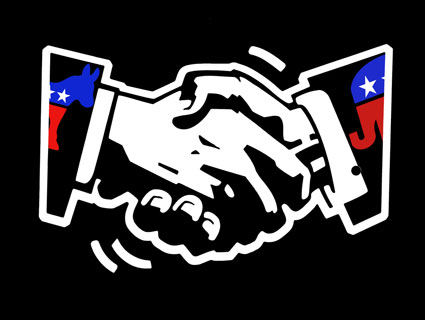
<a href="http://www.shutterstock.com">Bjorn Stefanson </a>/Shutterstock
Everything was supposed to be “on the table” in the crafting of deal to avert the so-called fiscal cliff. But in the end, congressional Democrats and Republicans skipped over some of the most glaring tax perks and giveaways. Case in point: Congress didn’t touch billions of dollars a year in freebies to the oil and gas industry that pad the profit margins of companies such as ExxonMobil and BP.
The final fiscal cliff deal does not touch oil and gas subsidies, confirms Rory Cooper, a spokesman for House Majority Leader Eric Cantor (R-Va.). Ending the costliest tax breaks for oil and gas companies would have raised tens of billions of dollars in revenue. Trimming just a handful of these breaks for the big five companies—BP, Chevron, ConocoPhillips, ExxonMobil, and Shell—would’ve raised $24 billion over the next decade. President Obama’s 2012 budget proposal called for ending 13 breaks benefiting oil and gas companies of all sizes; it would have saved $46 billion over 10 years.
There was a window of time around the November elections when it looked as if these subsidies might, just might, face even the slightest cuts. At the first presidential debate, Mitt Romney, whose closest allies included the head of the oil lobby, said oil subsidies were on the table if corporate taxes were lowered. Rep. Fred Upton (R-Mich.), chair of the powerful House energy and commerce committee, said in a debate that he’d end all energy subsidies, including those for oil and gas. And a week after the election, House Speaker John Boehner (R-Ohio) refused to rule out trimming oil and gas subsidies as part of a fiscal cliff deal.
But oil and gas giveaways have a knack for surviving even the fiercest fiscal showdowns. (See: Congress’ 1986 tax-reform battle.) Because they’re baked into the tax code, the industry and its lobbyists only have to defend their billions in perks; the wind and solar industries, by contrast, must fight and claw to extend the breaks they receive, which include expiration dates. The fiscal cliff deal also preserved tens of billions of dollars in tax credits for renewable energy production and research.
“We’re certainly not asking for anything on Capitol Hill,” a staffer with the American Petroleum Institute, the oil industry’s top lobbying shop, told the AP in late November. And he wasn’t lying: the industry doesn’t necessarily want anything new from Congress. It just wants to keep what it already has.
Which is exactly what happened in the fiscal cliff drama. The oil and gas industry preserved its bountiful status quo so that the billions in breaks continue to flow. Game, set, match, Big Oil.












